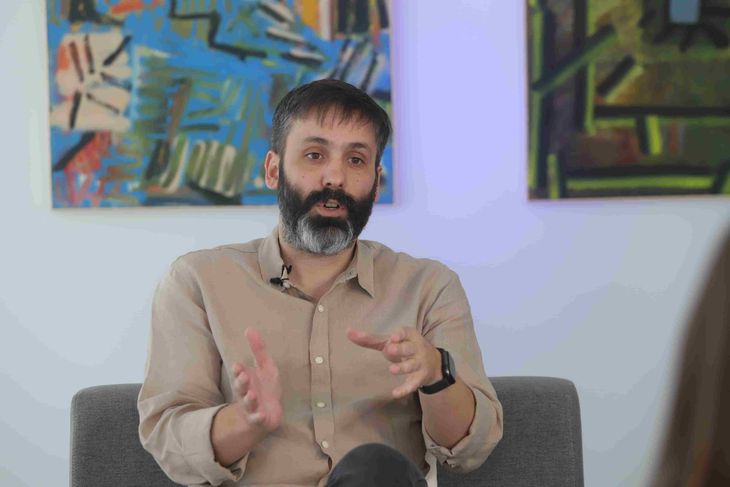“For months we have been constructive about what is happening in Argentina. Going on the right path and with a lot of conviction, Much more than we have seen in many years, if politics ends up supporting us, we believe it is a very relevant turning point,” he ventured.
And he reflected that “the prices show it,” highlighting the rise in Argentine stocks and the decline in country risk. “They are signs that the path is the right one, but there is still a long way to go,” express.
The “tailwind” at the international level
Posleman admitted that “the international context is also helping, with a little tailwind”, when referring to the lowering of rates of the United States Federal Reserve (Fed), whom he praised for “managing the times well and ensuring that there is a general conviction that we are going to see a soft landing, the best scenario for emerging markets.”
posleman.jpg
“That, if it continues to occur over time and the data continues to be good in employment, growth and inflation and falling rates, for Latin America in general and emerging countries it is very good data. Whenever there was a drop in rates in the US, there was a movement of capital flow from central countries to emerging countries looking for some profitability and that is already happening,” He highlighted and spoke of the challenge that the government has to “achieve that trust.”
Savoldelli admitted that “the international context is favorable and what is happening with the FED and the interest rate is fundamental for emerging markets” and called for “we to start doing things in a much more orderly way to be able to take advantage of that opportunity.”
“The key is to capitalize on that at the national level. Argentine companies are first class and if macro conditions are not favorable it is very difficult to obtain the financing that we are beginning to see now. There is a lot to do to take advantage of this context, which is a tailwind,” he observed.
In that sense, the Ualá representative pointed out that “fiscal balance as an anchor or flag is essential to give this signal” and added that “in terms of inflation it is being seen that they are taking some measures that are in the right direction to take advantage of a context that looks favorable.”
Financial stability and the impact on the real economy
Regarding the improvement at a financial level and its consequence in the real economy, he compared: “In the financial market you can enter and exit with one click. That is why financial markets always anticipate what is happening. “It is not the same to put a million dollars of financial investment in a bond that pays out in five minutes, than in a factory, which pays out in ten years.”
“It is a necessary condition, but not sufficient, for the macro to stabilize. There will always be a stabilization in the financial system that tends to be minimized, but if this does not happen the real economy will not react. One thing leads to another,” he warned.
“For me it is very relevant that the interest rate goes down, that the dollar and inflation are stable. It generates confidence so that later the SME that has to hire more people or invest to buy a machine is encouraged to do so,” observed the PPI representative, who also highlighted that for the government “The most relevant focus is deregulation, as a way to gain competitiveness by lowering costs.”
Savoldelli regretted that “Argentina has not grown for 15 years” and considered “a necessary condition to organize the macro for the economy to grow sustainably.” “If we order and do things well, the economy will react. “We are optimistic if we continue on this path,” he expressed.
He assured that “the market is armed with expectations and confidence” and the government “is trying to build a little in these months so that the economy also begins to take off.”
The investment profile
Regarding investors, Savoldelli acknowledged that “it is changing at the user level,” although he admitted that “The flow against dollars continues to be maintained because, when it goes up, the user thinks that it is going to go up and it is the way to hedge, but, if it goes down, they buy in case it will be cheap.”
“More and more users choose to operate the MEP dollar and discover other investment options. They continue to use a common investment fund, a fixed term with rates that fell and are rising again and become interesting against projected inflation,” he added.
savoldelli.jpg

Meanwhile, Posleman highlighted the growing interest in pesos. “There are more and more questions from those who had bought MEP and CCL dollars. Before it was unthinkable that someone would tell you I have to sell and put myself in pesos, but today people see that for five months they have been losing a lot of money with the dollar, up to 4 or 5% per month, while interest rates are slightly positive, which favors the carry trade,” he said.
“Before, people did not have confidence and in the last two or three months more and more people choose to have part of their portfolio in pesos at the rate. It is a great achievement for the government, because it is a genuine demand for pesos,” he noted.
The winning sectors of the situation and money laundering
When referring to the sectors that have gained momentum in recent times, Posleman assured that “the energy is clearly the standout, especially the oil, although also the mining and the lithium, as well as the banking sector, which had a rebound from historical lows because the State is withdrawing so that the market can begin to take on debt with stable rates and has to grow a lot.”
Savoldelli also mentioned the energy and financial branch, pointing out that “they are coming in very well” and lamented: “We would love for there to be more sectors. “We have many companies that for various reasons the market did not incorporate.”
As for a possible star asset, both specialists highlighted Argentine bonds, among which they highlighted global bonus GD35 and to BOPREAL.
Lastly, about the bleach, The Ualá representative considered that “it is a great opportunity” and appreciated that “the government made the effort to align the incentives and let’s see the numbers we see today,” while indicating that “Now we have to ensure that the dollars stay in the system and are transformed into investment, savings and credit.”
In this regard, Posleman added: “We always believed that it was going to be a success because in Argentina there is a gigantic black economy and it needs to turn to the real economy. 12,000 million in cash were laundered, but more is missing.”
And he recalled that “80 or 90% of the average investor is in cash assets or real estate, something that is a product of history.” “Changing that culturally is going to take 30 years because we already had a failed experience. So this is not a 100-meter race, but a marathon,” he concluded.
Source: Ambito
I am an author and journalist who has worked in the entertainment industry for over a decade. I currently work as a news editor at a major news website, and my focus is on covering the latest trends in entertainment. I also write occasional pieces for other outlets, and have authored two books about the entertainment industry.




